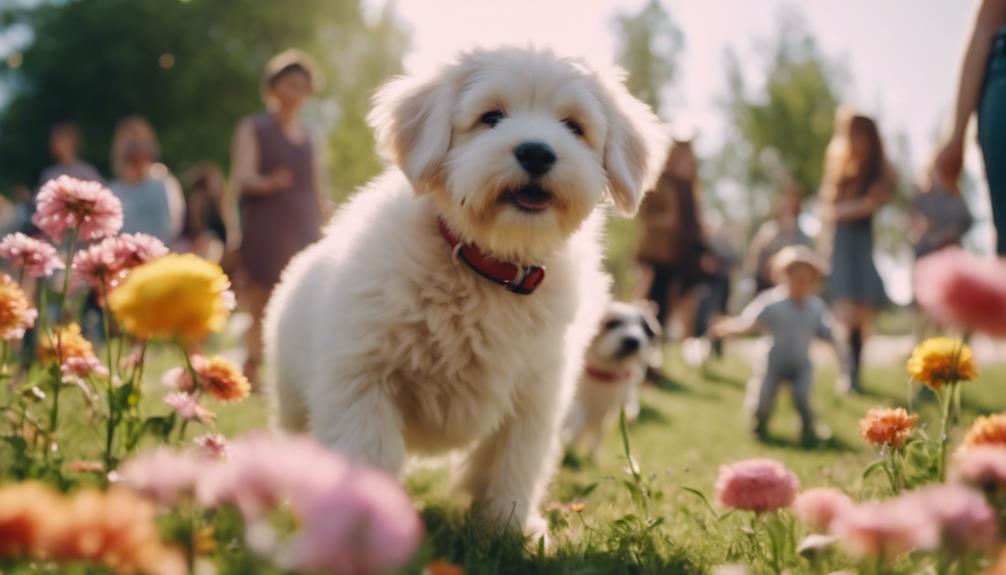Socializing your puppy is a crucial aspect of their development, laying the foundation for a confident and well-adjusted adult dog. To effectively introduce your puppy to various stimuli, it is important to start the process early, ideally during the critical socialization window of 3 to 14 weeks. Utilizing positive reinforcement strategies can facilitate this learning experience, making it both enjoyable and effective. However, the nuances of socialization extend beyond mere exposure; understanding how to navigate interactions with other dogs and new environments can significantly impact your puppy's long-term behavior and temperament. What strategies will prove most beneficial in this formative stage?
Understanding Corgi Behavior
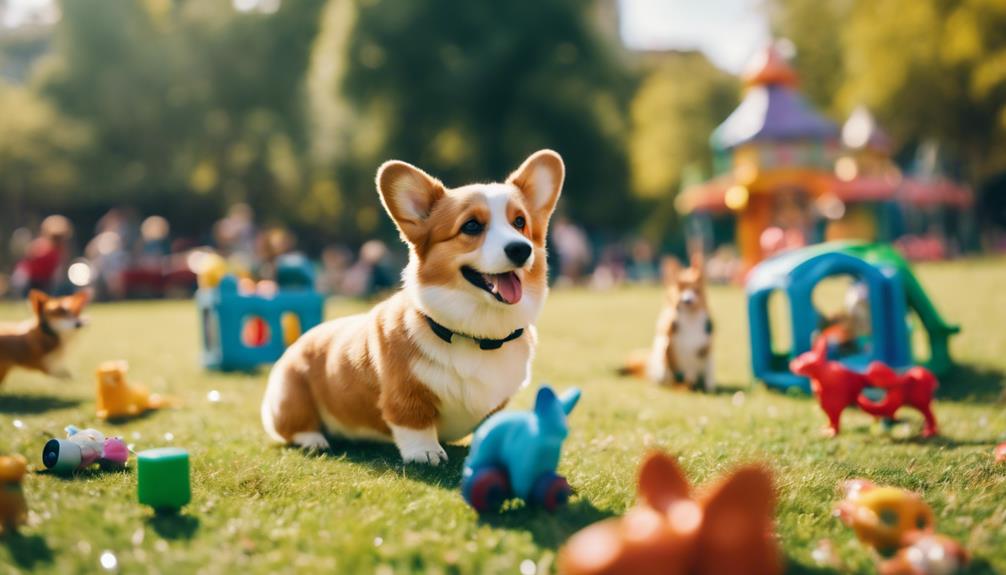
Understanding a Corgi's behavior is essential for effective training and socialization, as their unique personality traits and instincts influence their interactions with people and other animals.
Corgis are known for their intelligence, playfulness, and loyalty, which are key breed characteristics. However, they also exhibit certain corgi quirks, such as a tendency to herd and a strong prey drive, which can impact their behavior in various situations.
To train a Corgi successfully, it is vital to recognize these traits. For instance, their desire to chase may necessitate supervision during outdoor play.
Additionally, consistent positive reinforcement helps reinforce desired behaviors. Understanding these nuances allows owners to create a nurturing environment, fostering a well-adjusted and sociable companion.
Early Exposure to Different Environments
Early exposure to a variety of environments is crucial for a puppy's social development, as it helps them adapt to new experiences and reduces the likelihood of fear-based behaviors later in life.
Introducing puppies to different settings, such as puppy parks and urban environments, can significantly enhance their confidence and social skills.
When visiting puppy parks, puppies interact with other dogs, learning vital communication cues. Urban environments expose them to various sounds, sights, and people, fostering adaptability.
To maximize benefits, consider the following:
- Start early, ideally between 3 to 14 weeks of age.
- Gradually increase exposure to new experiences.
This proactive approach lays a strong foundation for a well-adjusted adult dog.
Positive Reinforcement Techniques
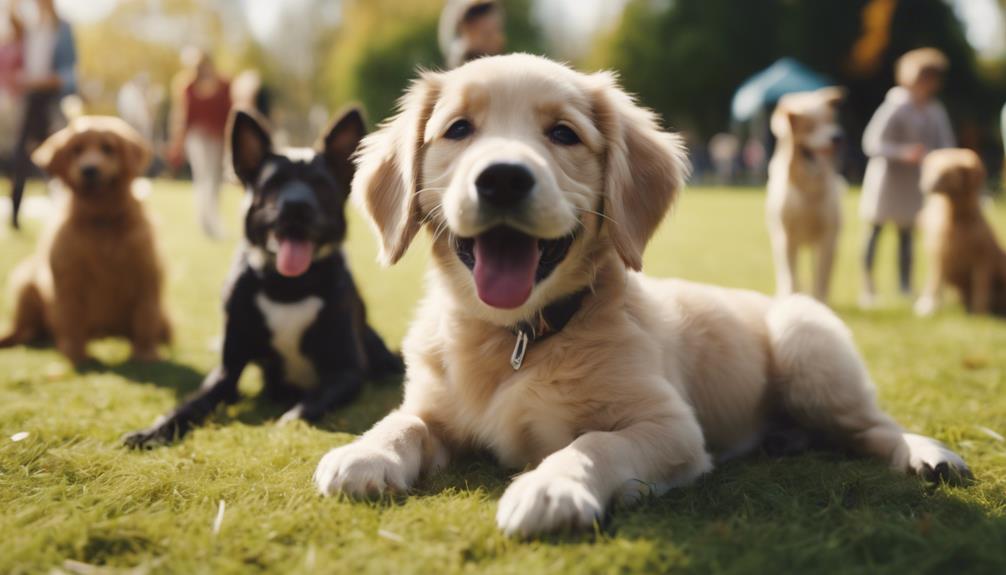
Positive reinforcement techniques are essential for effective puppy training and socialization.
By rewarding desired behaviors, using treats effectively, and ensuring timing is crucial, owners can foster a positive learning environment.
These methods not only encourage good behavior but also strengthen the bond between the puppy and its owner, leading to a well-adjusted pet.
Reward Desired Behaviors
Utilizing positive reinforcement techniques effectively encourages your puppy to repeat desired behaviors and fosters a strong bond between you and your pet.
Rewarding your puppy immediately after they exhibit a desired behavior is crucial for effective behavior shaping. This can include verbal praise, petting, or, at times, puppy rewards that recognize their good actions.
Consistency is key; ensure that your responses to behaviors are uniform. For instance, when your puppy sits on command, promptly offer a reward.
Over time, this repetition helps your puppy understand which behaviors are favorable.
Use Treats Effectively
Treats play a vital role in reinforcing desirable behaviors in puppies, serving as a powerful tool for effective training.
Choosing the right treat types is essential; soft, small treats are often preferred because they can be eaten quickly, keeping the training session flowing. Additionally, high-value treats, such as small pieces of cooked chicken or cheese, can motivate your puppy during challenging situations.
Treat timing is equally critical. Delivering a treat immediately after your puppy performs the desired behavior helps them make the connection between the action and the reward.
Consistency in using treats will strengthen positive behaviors over time. Remember, the goal is to create a fun and rewarding experience that encourages your puppy to learn and socialize effectively.
Timing Is Crucial
Effective timing in the delivery of rewards is essential for reinforcing desired behaviors in puppies during training sessions. Utilizing appropriate timing strategies ensures that puppies associate their actions with positive outcomes.
During critical periods of development, puppies are particularly receptive to learning. By rewarding good behavior immediately, you create a clear connection between the action and the reward, which is vital for effective training.
For instance, if your puppy sits on command, provide a treat right away. This immediate reinforcement helps the puppy understand what behavior is being rewarded.
Additionally, consistency in timing helps puppies learn faster and builds their confidence. Remember, the sooner you reward your puppy, the more likely they are to repeat the desired behavior in the future.
Socializing With Other Dogs
Socializing with other dogs is critical for your puppy's development and helps them learn appropriate behaviors.
It is essential to arrange controlled playdates where your puppy can interact in a safe environment, allowing them to build confidence and social skills.
Additionally, observing their body language during these interactions will provide valuable insights into their comfort level and help you guide their experiences effectively.
Controlled Playdates Essential
Arranging controlled playdates with other dogs is crucial for fostering your puppy's social skills and ensuring positive interactions. By prioritizing playdate etiquette and safe introductions, you create an environment that encourages healthy behavior and reduces anxiety.
Here are some essential guidelines to follow:
- Choose dogs with similar energy levels for compatibility.
- Supervise all interactions to prevent unwanted behaviors.
- Allow for gradual introductions in a neutral space.
- Keep play sessions short to avoid overstimulation.
Implementing these practices will help your puppy learn vital social cues and develop confidence when interacting with other dogs, ultimately contributing to a well-adjusted adult dog.
Observe Body Language
Observing body language during interactions with other dogs is vital for understanding your puppy's emotional state and ensuring their safety in social situations. By paying attention to body language cues, you can gain insight into how your puppy is feeling. For instance, a wagging tail often indicates excitement, while tucked ears may signal fear or submission.
Key body language cues to watch for include:
- Tail position: High can suggest happiness, while low indicates anxiety.
- Posture: A relaxed stance shows comfort, whereas stiff body language may indicate tension.
Understanding these signals enhances puppy communication and helps create positive interactions during playdates with other dogs.
Meeting New People
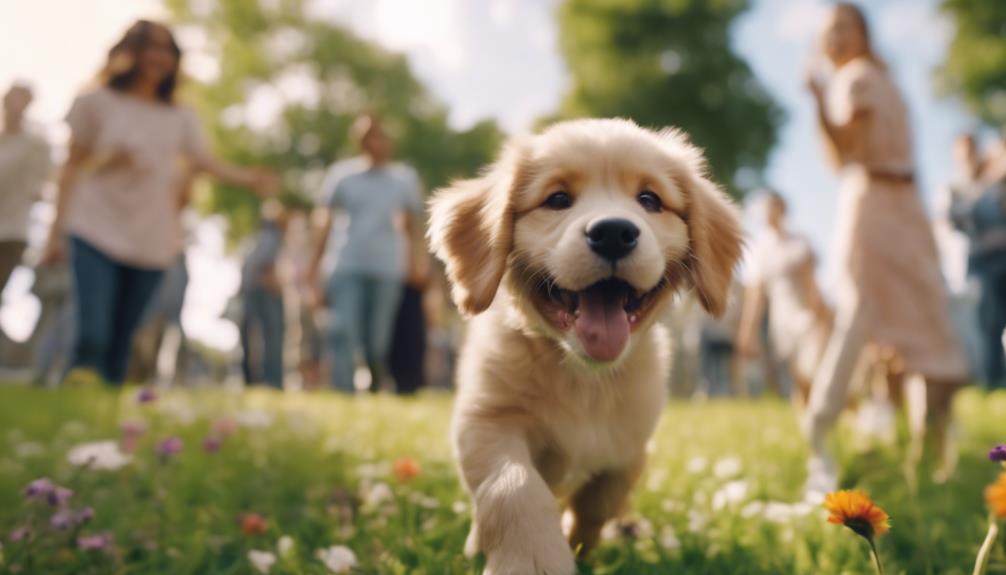
Introducing your puppy to a variety of people is essential for developing their confidence and ensuring they become well-adjusted adults. Exposure to different personalities helps your puppy learn how to interact with strangers appropriately. Each encounter can shape their behavior and responses, influencing their overall disposition.
To facilitate positive stranger interactions, consider the following tips:
- Choose calm individuals to meet your puppy first.
- Encourage gentle petting and soft voices to create a comfortable atmosphere.
- Observe your puppy's reactions to different personalities and adjust accordingly.
- Reward your puppy with treats for positive behavior during interactions.
Handling Different Sounds
Familiarizing your puppy with various sounds is an important aspect of their socialization, as it helps them become more adaptable and less fearful in different environments.
To achieve this, utilize sound desensitization techniques, which involve gradually exposing your puppy to different noises. Start with soft sounds, such as a ticking clock or light music, and slowly increase the volume or complexity.
Environmental sound exposure is crucial; take your puppy on walks where they can hear traffic, children playing, or construction noises. This process not only builds their confidence but also encourages a calm reaction to unexpected sounds.
Enrichment Activities for Corgis
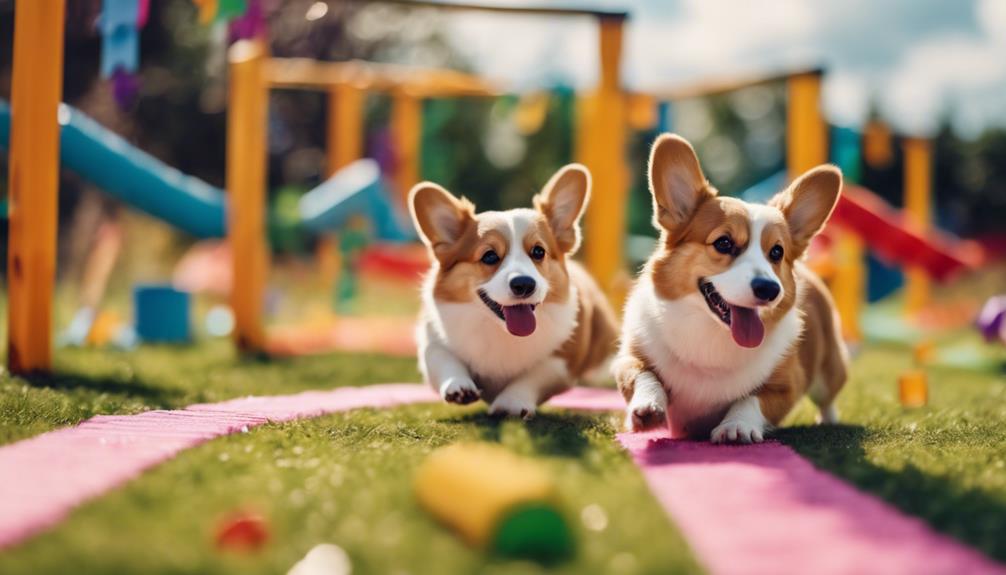
Engaging in enrichment activities is essential for Corgis, as it stimulates their minds and helps channel their natural energy into positive behaviors. These activities can reduce boredom and prevent destructive habits.
Incorporating cognitive challenges and interactive toys can greatly enhance your Corgi's mental and physical well-being. Consider the following enrichment activities:
- Puzzle feeders: Encourage problem-solving while providing meals.
- Hide and seek: Stimulate their instinct to search for treats or toys.
- Obstacle courses: Promote agility and physical exercise.
- Scent games: Enhance their natural scent-tracking abilities.
Consistency in Training
Consistency in training is crucial for establishing clear boundaries and expectations, enabling your puppy to learn effectively and develop desirable behaviors.
By implementing positive routines and maintaining structured training schedules, you provide your puppy with a predictable environment. This predictability helps reduce anxiety and fosters confidence.
To achieve consistency, ensure that all family members use the same commands and reinforcement techniques.
Regular training sessions, ideally lasting 5 to 10 minutes, can strengthen your puppy's understanding. Additionally, practice in various settings, gradually introducing distractions to enhance their focus.

